Versant Health’s Fourth Annual Vision Wellness Study Reveals Lack of Understanding of the Connection between Eye Health and Overall Wellness
Versant Health’s fourth annual Vision Wellness Study, released today, finds that three in four Americans experience disruptions in daily activities due to poor eyesight or eye health, such as driving at night, reading, and using screens. Yet, more than half (54%) delay or avoid eye care because it doesn't "feel urgent.”
Increased awareness of the connection to overall health is one of several factors that can influence proactive eye care. Versant Health’s research identifies other key barriers to be addressed:
- Cost concerns: 53% of people who get their eyes tested less than once every two years cite cost concerns or a lack of access to vision care benefits as the reasons why.
- Perceived inevitability: 66% of Americans see deteriorating eye health as an inevitable part of aging.
- Deprioritization: 63% are prioritizing other aspects of their health, a figure that’s even higher among Gen Z (69%) and Millennials (70%).
“A vision benefit isn’t just an add-on – it can be a cornerstone of comprehensive care,” said Neelam Gor, MD, Chief Clinical Officer at Versant Health. “Our study highlights how vision benefits can serve as an essential bridge to regular eye care, but only when the coverage is understood and perceived as valuable.”
Consumer Knowledge Gaps Undermine Engagement
The research findings reveal significant knowledge gaps related to eye care and vision benefits.
Only 55% of consumers can correctly define the difference between a comprehensive eye exam and a simple vision screening. Even fewer understand the full diagnostic capabilities of eye exams – for example, just 30% are certain that an eye exam can help diagnose diabetes, and only 25% are certain about its role in hypertension detection. Yet nearly 9 in 10 people (86%) say they are more likely to schedule an eye exam when they understand how comprehensive eye exams can provide early detection for serious medical conditions such as diabetes, heart disease, and high blood pressure.
Vision and health care carriers, along with eye care providers, play a critical role in addressing these knowledge gaps. Consumers are signaling a desire for more engagement from vision and health care carriers, including:
- 71% are likely to seek advice about eye health from vision or health care carriers.
- 75% are looking to their eye care providers to share advice on how nutrition can improve eye health.
- 86% of parents are seeking healthy eye care advice for children.
In addition to eye health guidance, most consumers would like a better understanding of vision benefits and how to use them. Two-thirds (67%) of people offered vision coverage through their employer or health plan report that the benefit’s value hasn't been clearly explained, or they find it confusing to select the right plan. Similarly, 61% of consumers say clearer explanations of how their vision plan works, such as what’s covered, out-of-pocket cost responsibilities, and available discounts, would make them more likely to enroll in vision benefits.
“Overcoming these barriers and the low sense of urgency is imperative for improving eye health outcomes. Our research shows that access to vision benefits, combined with an understanding of how the coverage works, are key drivers of seeking eye care,” said Meredith Ryan-Reid, Versant Health CEO. “When carriers, vision care providers, and employers help connect vision care with overall health, four in five people enrolled in vision benefits are more likely to use them.”
Visit www.versanthealth.com/vision-wellness-study to explore the complete findings.
Research Methodology
Versant Health’s 4th Annual Vision Wellness Study (2025) is based on both quantitative and qualitative components:
- The quantitative study was based on an extensive sample size of 3,045 U.S. adults aged 18 and older. Respondents had to at least share responsibility for health care decisions or be the primary decision-maker in their household. The survey captured numerous data points related to demographic information including age, gender, ethnicity, geographic location, employment status, occupation, and household income. Some weighting was applied to ensure representativeness and consistency with the Bureau of Labor Statistics (BLS) data. Weights were applied to age, gender, geographic location, and employment status.
- The quantitative data was supplemented by 42 interviews across a variety of audiences, including U.S. consumers (including people enrolled in vision care benefits and those who were not), eye care professionals, employee benefits brokers, health plan executives, and HR decision-makers in small, mid-size, and large businesses.
The surveys, interviews, and analysis were conducted by STRAT7, a global strategy, insights, and analytics consultancy, in partnership with Versant Health.
About Versant Health
Versant Health, Inc., part of the MetLife family of companies, is one of the nation’s leading administrators of managed vision care, serving 35 million of our clients’ members nationwide. Our purpose is to make healthy vision a reality for everyone by improving access to care and education in the communities we serve. Fueled by our mission to improve members’ lives with easy-to-use vision solutions rooted in choice, value, and care, Versant Health believes that everyone has the power to become anything they set their sights on.
View source version on businesswire.com: https://www.businesswire.com/news/home/20250701144103/en/
“A vision benefit isn’t just an add-on – it can be a cornerstone of comprehensive care,” said Neelam Gor, MD, Chief Clinical Officer at Versant Health.
Contacts
For Media:
Rachel Pokay
rachel.pokay@versanthealth.com
210-202-8498






